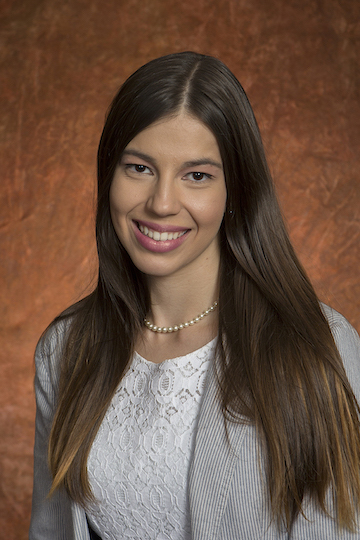Student Spotlight: Inmaculada C. Sorribes
Inmaculada C. Sorribes is a two-time graduate of the Florida State University Department of Mathematics, part of the College of Arts and Sciences.

"I saw an opportunity to help people through applied mathematics,"
Inmaculada C. Sorribes said.
Where are you from? Can you give us an overview of your academic credentials?
I grew up in Albacete, a small city in Spain located midway between Valencia and Madrid. I earned my undergraduate degree in mathematics at the Universidad Autonoma de Madrid. During my last year, I was awarded a scholarship to study abroad at The George Washington University. I received my master’s in mathematics here at Florida State in 2016, and just defended my dissertation in biomathematics this spring to gain my Ph.D.
What brought you to FSU?
The biomathematics program brought me to Tallahassee. I started doing research in mathematical models of cancer as an undergraduate, and I wanted to continue down that path. The program at FSU was advertised on the Society for Mathematical Biology website. After looking at work done by FSU faculty, I was impressed. The deciding factor was the funding package the university offered me.
What inspired you to choose your major and specific areas of research?
I have always loved mathematics because I find this field applicable to almost anything. Many people challenged my decision to pursue this degree, but I saw an opportunity to help people through applied mathematics. In my second year of undergrad, I contacted a professor whose focus was on cancer research, and I was immediately drawn to the work. This is personal for me since I lost my grandparents to cancer. Being able to apply my passion in this way has allowed me to be a part of the bigger fight against this deadly disease.
What aspect of mathematics do you find most exciting?
Math can be applied to anything. Mathematical models are used for weather prediction, vaccination and disease management, traffic flow, economics, decision-making and more. Now, with the migration toward personalized medicine, mathematical models will play a fundamental role.
After graduating, what are your plans?
I have accepted the William W. Elliott Research Assistant Professorship at Duke University, so for the next three years, I will be teaching various math courses and continue research in mathematical oncology.
Are there any faculty/staff that have helped or inspired you?
My adviser, assistant professor of mathematics Harsh Jain, has been important to my journey. I was drawn to his work in cancer modeling, and his continuous help, encouragement, and drive for perfection have allowed me to develop my research skills. Professor of biochemistry Amy Sang is a passionate, curious and all-around pure researcher I find inspirational. Having a female scientist role model like her has been motivating for me. Marion Bradley Brennan Professor of mathematics Nick Cogan has taught me about work-life balance and how to be a good person.
What on-campus sources/departments or offices have helped prepare you for academic success?
The Center for Global Engagement has been one of the biggest assets for me at FSU. As an international student coming to a new country, learning and adapting can be challenging, but the staff at the center is absolutely fantastic. They helped me even before I arrived in town and they continue to help me now.
I also have to mention the Congress of Graduate Students, where I have served as a disabilities advocate. Being part of such a group helped give me a broader perspective on graduate academic life.
What do you like to do when you’re not working on schoolwork or research?
I like to exercise – running or hiking – spend time with my friends, enjoy a movie or cook a nice dinner. Also, I am Spanish, so a siesta is always nice.
Although you might miss FSU, what are you looking forward to in your post-graduate life?
I am looking forward to starting new things and to meeting different challenges. New research means new opportunities to learn and grow, and I will also be able to teach classes I am passionate about.
What advice do you have for fellow students?
Pay attention to your mental and physical health during school. The pressure of school work and research can become overwhelming, especially toward the end. It is okay to take time for yourself, and doing so will actually help you be more productive.
Take advantage of organizations and groups and build up your resume throughout your time here: Don’t wait until the last year.
Finally, step out of your comfort zone: Go to as many conferences as possible and present your work. Talk to people even if it feels intimidating.

